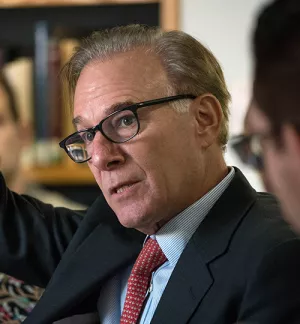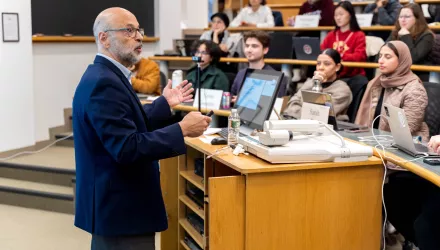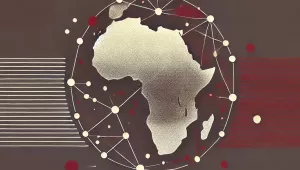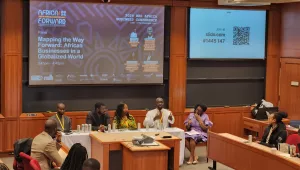The Georgian government of President Mikheil Saakashvili, long a favorite of U.S. conservatives for championing pro-democratic “color revolutions,” is under fire for its own alleged suppression of a domestic opposition movement headed by a billionaire tycoon.
Saakashvili was lauded as a reformer after he became president in 2004, following the Rose Revolution, and he has bravely challenged Russian hegemony in the region. But he has also shown a tendency to overreach, as in the imprudent military moves that offered Russia a pretext for invading Georgia in 2008. Now, critics charge, his government has been overly zealous in combating political challengers at home.
Saakashvili’s rival is a wealthy businessman named Bidzina Ivanishvili, who made a fortune in Russia before returning home to form a political party called Georgian Dream. Ivanishvili’s supporters allege a series of repressive moves by the government, including a cyberattack that has ensnared not just Georgian activists but U.S. lawyers, lobbyists and security advisers for Georgian Dream.
Allegations about the cyberattack were made to State Department officials in a Sept. 7 briefing by Tedo Japaridze, a former Georgian ambassador to Washington, and other members of a team representing the opposition group. Japaridze charged, “The government has turned the campaign into a war between the ‘state’ and the ‘enemies of the state.’ ”
The Georgian political battle has seen allegations of dirty tricks by both sides, but the cyberattack appears to be an escalation. According to Ivanishvili’s supporters, investigators found 66 malware infections on five computers operated by Ivanishvili, his family and close advisers. The viruses had spread to about 50 other machines.
The malware was cleverly designed: It could turn on the computers’ cameras and microphones, capture screen shots every 10 seconds, and record keystrokes and passwords, the State Department was told. One “screen grab” I saw was a June 7 bill to Ivanishvili from National Strategies LLC, a Washington-based security advisory firm. Another was a June 4 message to Ivanishvili from an attorney with the Washington firm Patton Boggs, which is heading his lobbying effort.
The cybercampaign evidently went beyond infecting individual computers: Japaridze’s team said that investigators discovered devices that could intercept data and insert malware into Internet traffic had been installed at several Georgian Internet service providers. The Georgian opposition group alleged that the use of these sophisticated tools “is clear proof of state security and intelligence activity in surveillance of the political opposition,” according to notes from the meeting.
This run-up to next month’s parliamentary elections has been thick with allegations of abuses on both sides. An August statement by the Council of Europe criticized the government’s seizing campaign funds as “a weapon to destroy the democratic opposition and target Georgian Dream supporters.” And Thomas Melia, the deputy assistant secretary of state for human rights, noted last week “a variety of shortcomings in recent months” but said that the United States still believes that “there is a competitive campaign under way.”
The Georgian Embassy said in a statement that Ivanishvili had not made any formal complaint about the cyberissue. “Had the government been informed about the alleged cyber attack, it would have acted vigorously to determine who had undertaken it,” the statement said, adding: “Should Bidzina Ivanishvili formally request that the government investigate this case, it will do so immediately. The country of Georgia itself was a victim of a vicious cyber attack in 2008, directed out of Russia, and so is exceedingly sensitive to this issue.”
Jeremy Rosner, a prominent U.S. pollster hired by Saakashvili’s party, cautioned that Georgian Dream has committed its own abuses, including inaccurate polling data that had led him to file a complaint with the group that oversees international polling. “Ivanishvili and his party are engaged in a systematic attempt to discredit the integrity of Georgia’s election system,” Rosner charged.
Saakashvili has claimed that his billionaire rival represents “Russian money” and that Ivanishvili’s election will undermine Georgia’s independence. The United States, which appreciates Georgia’s decision to send troops to Iraq and Afghanistan, has stayed neutral, urging that the parliamentary elections next month and presidential election in October 2013 be “free and fair.”
What’s happening in Georgia is partly a proxy war, as a jittery and sometimes overzealous Saakashvili government tries to cope with a Russia that increasingly wants to assert its influence. The political tension spiked Wednesday, with graphic reports from Georgia of police abuse of prisoners.
The Georgian battle, to me, illustrates the modern folk wisdom, “What goes around, comes around.” The Rose Revolution made Saakashvili a role model for democratic challenges to autocratic rulers in Ukraine, Iran and elsewhere. But in this year’s murky campaign, Saakashvili’s regime risks becoming a symbol of what he once so eloquently opposed: the resistance of an entrenched elite to political change.
Ignatius, David. “Georgia’s Rowdy Election Campaign.” The Washington Post, September 19, 2012





